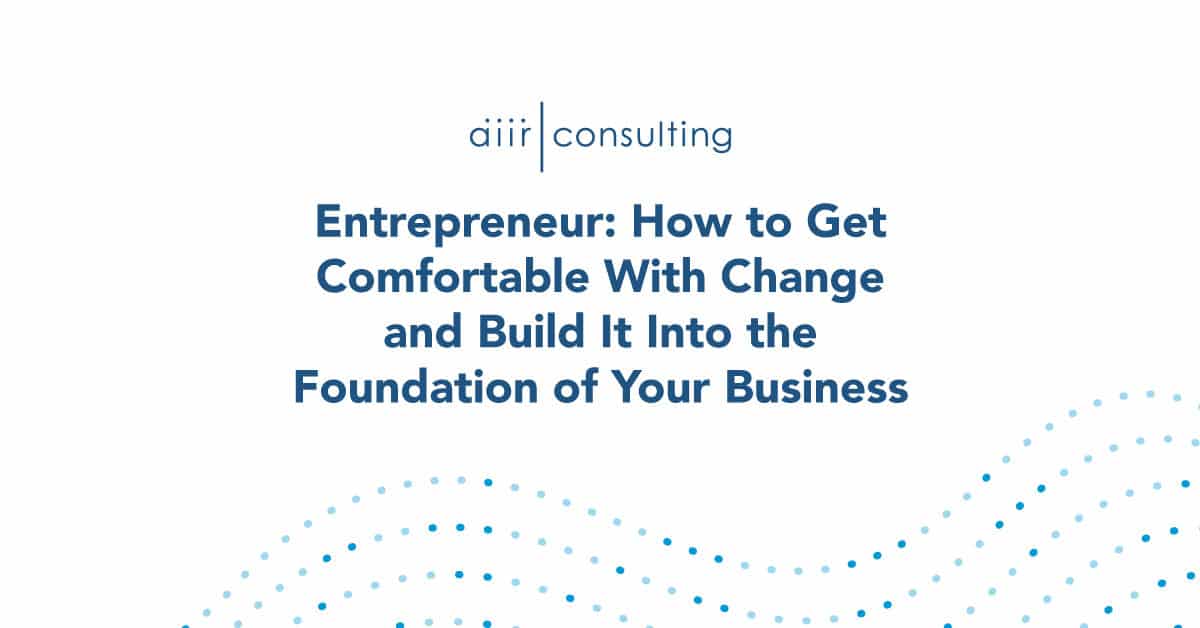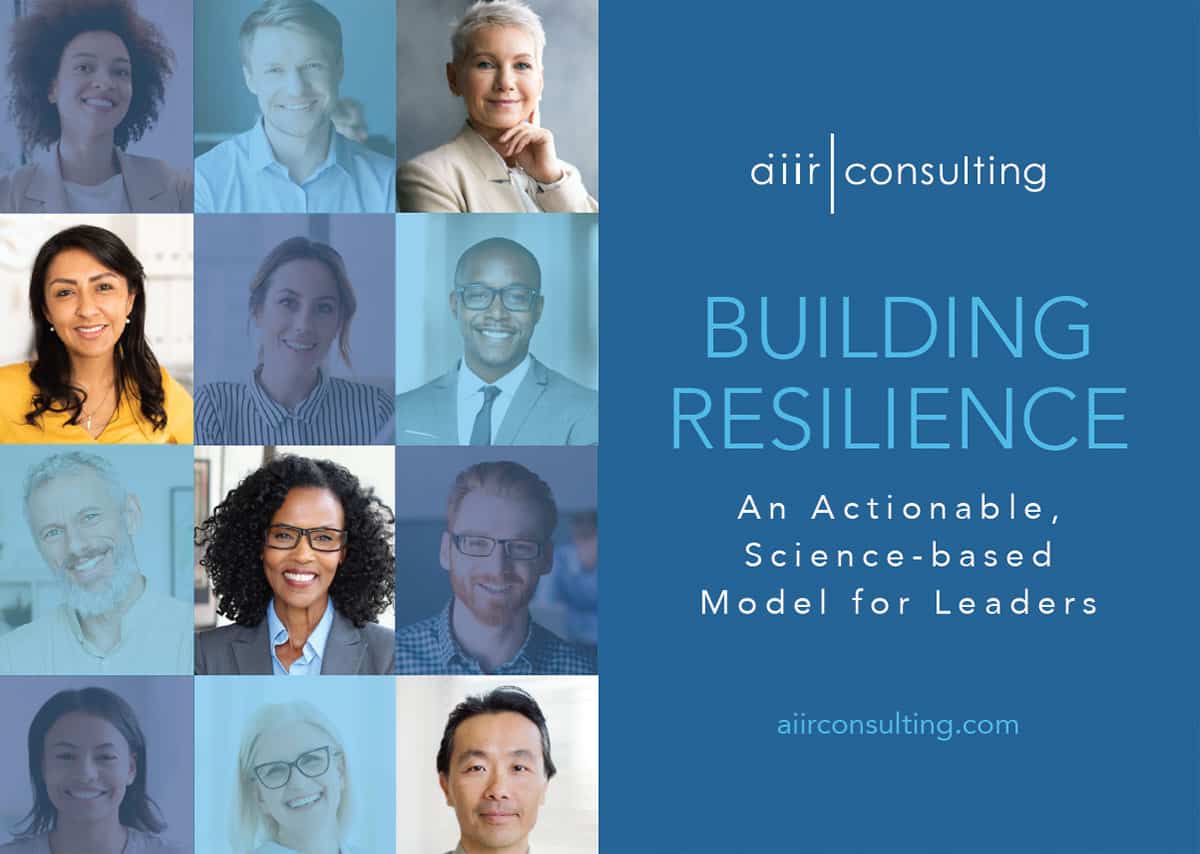
Entrepreneur: How to Get Comfortable With Change and Build It Into the Foundation of Your Business
By AIIR Consulting | December 7, 2022
Finding the Right Balance Between Steady Restructuring and Unorganized Disruption is a Scale all Change Leaders Must Know How to Balance
Editor’s Note: this article originally appeared in Entrepreneur Magazine.
Life in business is a never-ending series of ebbs and flows. The moment we learn to surf one wave, conditions change and we must paddle furiously to catch the next.
Change is a constant, not a single passing event. As leaders, we need to prepare accordingly. No matter how high the swells or how many times we get knocked off the board, we can’t afford to take our eyes off the wave we’re on or those looming on the horizon. Great change leaders know how to live in the present and the future, they know when it is and isn’t appropriate to implement change, and lastly, they know how to embed change resilience into their organizations.
Stay laser-focused on the now, but live in the future
To be effective, leaders must learn how to distribute their focus between the present and the future. They need to be able to pour everything they have into the work at hand without losing sight of future goals and potential roadblocks. Every new CEO I’ve coached describes this duality as one of the most unnatural yet vital muscles to develop.
Success requires aiming for the best-case scenario but preparing for the worst. This ability is crucial during times of crisis, distress or macroeconomic headwinds. When you’re prepared for anything that might happen tomorrow, you can focus intently on the work that needs to happen today.
How to know it is time to change
It can be tricky to identify when you need to make a change or what that change should even be. Balancing the evolutionary mandate for change with the human need for stability is paradoxical. If you change too much and too fast, your customer may lose track of your core identity. If you change too cautiously and too slowly, your customer may deem you irrelevant. Sometimes leaders can become so accustomed to change that they reflexively make changes without adequately assessing the situation.
A leader I recently worked with wanted to blow up a well-constructed organizational design only a year and a half after implementing it. Had the leader not paused to assess, she wouldn’t have realized that the root cause of her frustration was competitive behaviors between divisions rather than the structure itself. As such, the most important thing a leader can do is take a metaphorical breath and do a proper assessment.
While there isn’t a playbook that outlines all the reasons to change, there are some common indicators that, if present, should put leaders on alert. Here are three important ones:
1. Growth has stagnated
This is an area in which leaders must be vigilant and proactive — if you allow your growth to slow without intervention, you risk falling behind, sometimes never being able to catch up. That said, a business’s growth could stagnate for various reasons, and leaders shouldn’t jump to conclusions and rush to overhaul their entire company due to one slow month. Know that your “spidey sense” or CEO intuition is not enough. Check in with employees, pulse customers and utilize data to diagnose your market. Whatever surfaces from your analysis, if it is significant and within your control to change, you need to pounce on it.
2. You see negative attitudes and behaviors
There is no such thing as perfect or bad behavior. Negative attitudes will always pop up, but when those behaviors and attitudes take on a more regular presence, it’s clear that something is wrong. It could be as simple as a toxic employee or group of employees undermining the business. What happens if attitudes and behaviors become pervasively negative? There’s rarely a quick fix, but the change mandate is quite urgent because you have a cultural issue. Just as culture takes time to build or unravel, your intervention must be realistically phased over time and highly intentional.
3. When disruptive threats emerge
Competition can be healthy, pushing all to grow and expand their offerings. However, if you have diagnosed a threat beyond mere competition, this is a time for intensive thinking and bold action. Consider Facebook’s adaptation to Meta. After facing brand-damaging internal leaks, intense scrutiny from the public and a huge blow to their advertising business due to changes in Apple’s privacy practices, they rebranded to the name Meta and pivoted their long-term strategy to the metaverse.
Build change into the system
People crave stability in the workplace, so how can leaders create a culture that prepares employees to adapt and change as needed?
A willingness to adapt begins with a strong foundation. Communicate your company’s mission, priorities and vision for the future with all employees. When your company’s purpose is clear, employees feel at ease knowing the foundation from which all change stems and can trust it is not arbitrary. Furthermore, they can quickly identify when something is not aligned with priorities and needs to be adjusted.
From this foundation, create space for reflection, dialogue and learning. Bring in new perspectives and encourage (and fund, if possible) employee learning. Meet frequently to discuss your priorities, goals and visions for the future, ensuring all are in alignment and adjusting as new information comes in. At my company, we assess our business quarterly through board meetings and team-wide retrospectives. My executive team also meets annually for a team offsite to determine our strategy and ensure we are all aligned on priorities for the coming year.
Strengthen your muscle for change
Don’t let a day go by without asking if there is anything you need to change. What is your core focus, and what should you prioritize? Are there any future roadblocks you’re not yet seeing? Learning to balance these conflicting needs all at once is challenging — straddling the present and future requires immense cognitive and emotional energy. Yet, when you’ve navigated those waves and smoothly glided to the shore, I don’t think you’ll regret those aching muscles. You might turn around, ready and eager to get right back out there.

